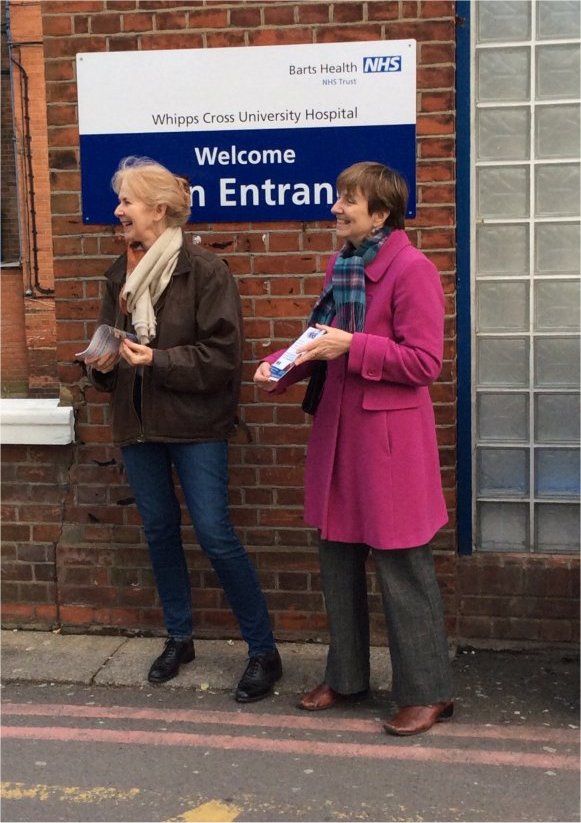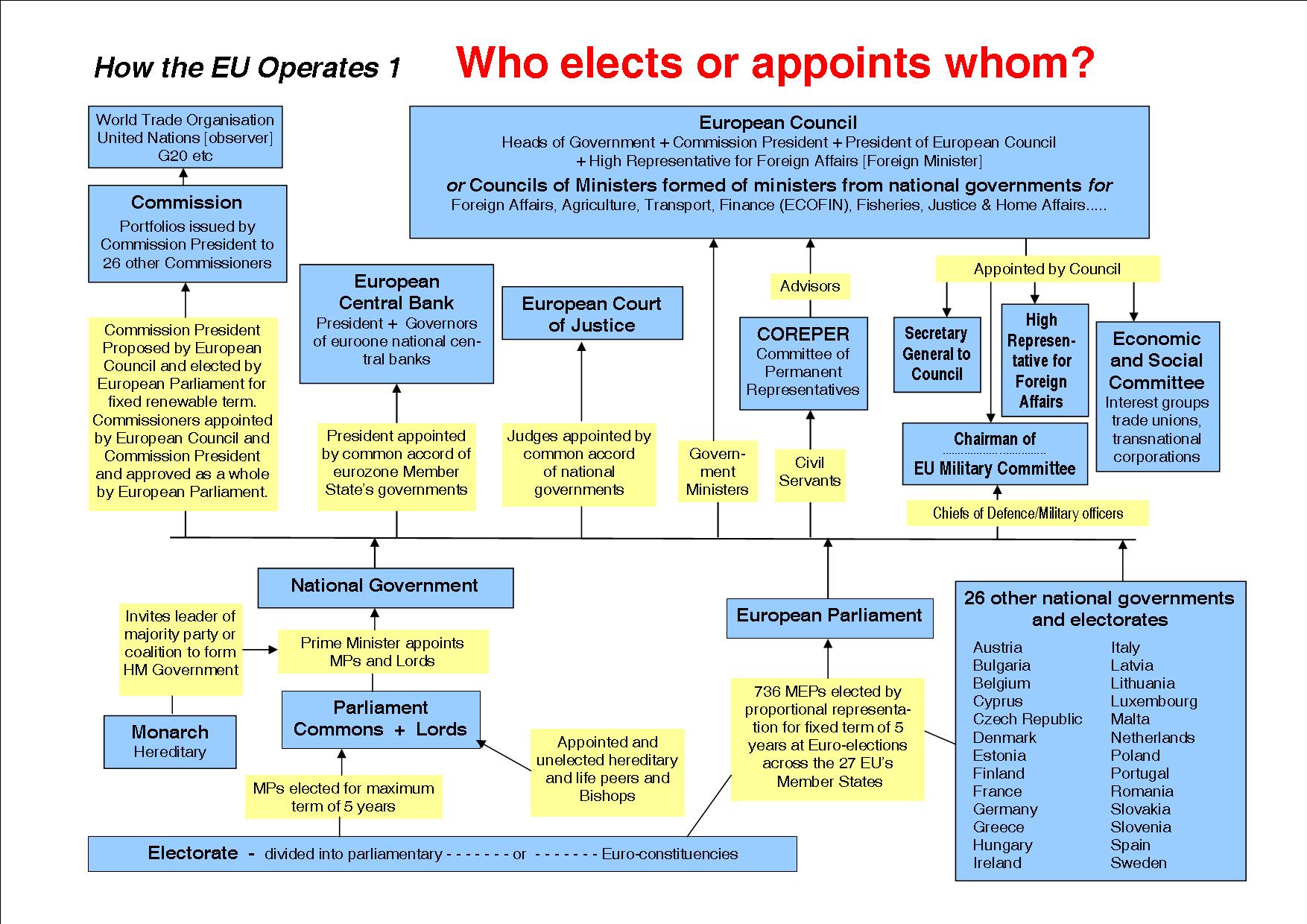
 |
||||
|---|---|---|---|---|
| Volume 44 Number 16, May 26, 2014 | ARCHIVE | HOME | JBCENTRE | SUBSCRIBE |
Workers' Weekly Internet Edition: Article Index :
The Staging of the European Elections
New Chief Executive and Government Changes to CCGs:
Taking the “Commissioning” of the NHS Services Further in an Anti-Social Direction
Weekly On Line Newspaper of the
Revolutionary Communist Party of Britain (Marxist-Leninist)
Website:
http://www.rcpbml.org.uk
E-mail:
office@rcpbml.org.uk
170, Wandsworth Road, London, SW8 2LA.
Phone: 020 7627 0599:
Workers' Weekly Internet Edition
Freely available online
Workers' Weekly E-mail Edition
Subscribe
by e-mail daily: Free / Donate
WW
Internet RSS Feed
![]()
The Line of March Monthly
Publication of RCPB(ML) Subscribe

NHA Party candidates in the European
electionsThere were two outstanding themes in the
electorate’s vote in the elections of May 22 to the European Parliament
and to local councils: opposition to the austerity agenda of the ruling circles
and the desire of people to end their marginalisation and gain control over
their lives. For the ruling circles, the outstanding agendas were to organise
an electoral coup and spread the maximum confusion. These came into a decisive
clash and represented two realities, or two opposing ways at looking at the
same reality.
The script for the elections had been written long before the polling stations opened. An “earthquake” was agreed as the appropriate description. Thus the people’s voice was drowned out.
The results of the elections showed that parties representing an alternative to the big three Westminster cartel parties were widely supported. At the same time, with the turnout at 34.19%, roughly two in three of the electorate did not vote in the European elections. The “United Kingdom” returns 73 members to the European Parliament, with an election every five years. The power, however, lies with the private monopoly interests and their representatives in the European Commission.

Dr Louise Irvine (right) and Dr Jacky Davis
campaigning on behalf of the NHA
Party at Whipps Cross hospital In these circumstances,
many of the parties which put forward a genuine alternative to the rule of the
monopolies and the dictate of their interests, whether through the Westminster
or European bodies, used the elections as a referendum on a change of direction
for the economy and society. They found it hard going, since there was a
virtual blackout in the monopoly-controlled media to anyone but a chosen few.
Whereas the canvassing showed opposition to the anti-social agenda of the monopolies and their representatives, and to dictate from Brussels and from Westminster, nevertheless the ruling elite were set on defining this opposition as at one with their own agenda of pushing xenophobia, of attacking the rights of all, and of making this agenda respectable in the form of UKIP. Thus they were intent on turning back the clock, while the parties who represented an alternative were forward-looking, working to safeguard the future of society.
Among the results that were buried in the prevailing media hype were the following. The Green Party had the fourth highest number of votes, after UKIP, Labour and Conservative. They gained one seat, and now have three MEPs. The Scottish National Party was next in the number of votes polled, above the Lib Dems, and returned two MEPs. Plaid Cymru also maintained its share of the vote, and returned one MEP. The National Health Action Party, standing for the first time and only in London, polled 23,253 votes, a very positive testimony to both their hard work and their drive to uphold the NHS as serving the needs of the population and not the private monopoly interests. (Their summing up can be found here). No2EU polled 31,757 votes, also demonstrating the stand against the Europe of the monopolies. The vote of the British National Party decreased by over 5%, and they lost both their European seats, demonstrating that racism and chauvinism was not the main vote-winner for UKIP.
The results of the elections showed two things. One is the desire of working people to hold the establishment parties to account for their assault on the rights of all, and for depriving them of power over their lives. Second is the need for political renewal, for raising the level of political culture and to involve the people in decision-making, not just around the issue of “getting the message across”.

Campaign against Euro-Federalism
The renewal of the polity demands the equality of treatment and opportunity to all political parties. This is not so much a question of fighting for left against right, but of fighting for the agenda of people’s empowerment, and organising the working class to take up its independent leading role.
The crucial issue is what the ruling circles are preparing for the general election. In the less than 12 months before the general election, the people’s forces must be gathered into a tide to defeat the austerity agenda, and work to open the path to people’s empowerment and a human-centred agenda. It is necessary to expose the fraud of the capital-centred agenda, whether on workers or on social programmes, and consolidate the forces of the progressive movement, with conscious participation being the watchword. This is not so much the politics of hope as the politics of necessity and of defence of the rights of all.
It looks as though the ruling elite could be preparing for a pact between the Tories and UKIP. There is no-one who the rich and powerful see as being able to come to power as their champion or possibly one could say, as their decisive champion. They wish to cover all their bases, promote racism and chauvinism, and negate the forces who stand for the public good and for a new vision for society. They see the possibility of the Lib Dems being wiped out as a viable partner in a Coalition. Their ideology, for example around the centenary of the inter-imperialist First World War, is to glorify the interests of monopoly capital and “defence of the fatherland”. This is how far they wish to turn back the clock.
In actual fact, as well as representing this racism and chauvinism, UKIP stands firmly for the austerity agenda, a fact which was largely hidden in their promotion. The people want to assert their sovereignty, but membership of the EU stands in direct contradiction. The fact is that the domestic system gives them no chance to do so either.
The issue for the progressive forces in the period before the general election in May 2015 is to organise to defeat the austerity agenda, and to open a path for the independent politics of the working class. The people will not accept the austerity agenda, and how to block this agenda before May 7, 2015, is a central issue. The important thing is to step up the struggles and take a stand. This is the central issue, not a pledge of allegiance to one political party and to forget both the day-to-day struggles as well as the aim of these struggles.

Campaign against Euro-Federalism
WWIE calls on everyone to raise the level of political debate, discuss in their factories and workplaces, educational institutions, hospitals and communities how to prepare effectively to contribute to the defeat of the Coalition and the fraudulent “austerity” agenda, and open the path to the independent politics of the working class.
European Parliament election 2014 results can be seen at: http://www.ukpolitical.info/european-parliament-election-2014-results.htm
ShareThis
New Chief Executive and Government Changes to CCGs:

Only a month
after taking up his role after being appointed by the present government, the
new NHS England Chief Executive Simon Stevens has set out plans to invite
Clinical Commissioning Groups (CCGs) to apply to co-commission the primary care
of GP practices and their services with area teams of NHS England when
previously this was the role of NHS England and its area teams under the Health
Social Care Act, 2012. Almost immediately, Jeremy Hunt, Secretary of State for
Health, endorsed this announcement. In a report on GP online, Jeremy Hunt said
that he backed the plans and this would set CCGs free to be the “guiding
lights” to “craft the entire out-of-hospital plans” in their
areas and that this was “even bigger and more ambitious” than the
creation of CCGs a year ago.
Within days of this announcement, on May 9, the National Director : Commissioning Development, Rosamond Roughtan and the Chief Operating Officer, Dame Barbara Hakin sent a letter1 to all 211 CCG Clinical Leads and the Area Directors of NHS England asking the CCGs to submit expressions of interest in these services by June 20. According to this letter, the scope of these immediate changes that have been made by Simon Stevens encompasses a wide spectrum of activity giving the scope of the changes, including:
• working with patients and
the public and with Health and Wellbeing Boards to assess needs and decide
strategic priorities;
• designing and negotiating local contracts (e.g. PMS, APMS, any enhanced
services commissioned by NHS England);
• approving “discretionary” payments, e.g. for premises
reimbursement;
• managing financial resources and ensuring that expenditure does not
exceed the resources available;
• monitoring contractual performance;
• applying any contractual sanctions;
• deciding in what circumstances to bring in new providers and managing
associated procurements and making decisions on practice mergers.
It is hard on the face of it to see from the scope of these changes what they mean in practice and what difference this will make to the present performance of CCGs, who now commission health services locally. The fact is that they generally operate behind closed doors, consulting neither health staff nor the public in the name of “working with patients and the public” as do the “area teams” of NHS England which was the sole national commissioner of GP services prior to this announcement. For example, NHS England is already involving CCGs in dissolving Personal Medical Services of GPs (PMS). This means, in other words, that they are already wrecking publicly provided and paid GP services and breaking them up and handing them over to either independent GP services, or even bigger private companies providing GP services. So they are already as Simon Stevens and the government admits involved in those decisions now.

Local Medical Committees conference held on
May 22 and 23, which overwhelmingly voted to
oppose charging for NHS GP services and opposed
the government's programme for the NHS Ruth Robertson on
the King's Fund blog drew the conclusion from this letter to CCGs as such:
“First, co-commissioning is optional: CCGs that are interested in an
extended role must submit an expression of interest – either alone or as
a group – by 20 June. Second, this is not a one-size fits all approach:
CCGs can choose from a spectrum of commissioning arrangements that include
fully delegated functions, joint decision-making or simply increased
involvement in the current decision-making process. Third, not all primary care
commissioning is up for grabs: community pharmacy, dental services and eye care
will stay with NHS England; as will registration, revalidation and the
appraisal of GPs. However, all other areas of primary care commissioning are
open to joint arrangements.” She further points out: “CCGs can
elect to take on responsibility for developing their local primary care
strategy; negotiating, managing and enforcing local contracts (e.g.,
Alternative Provider Medical Services (APMS), Personal Medical Services (PMS));
financial management; and taking decisions on new local providers and practice
mergers.”
So one thing that is clear from the changes that have been made is that the last bullet point is the nub of matter. That is, CCGs “will now decide on what circumstances to bring in new providers and managing associated procurements and making decisions on practice mergers”. Previously this was not written into the Health Social Care Act 2012 because of the conflict of interest between GPs who provide the commissioning of all health care services in their area and the commissioning of their own independent practices in the same area.
Of course, it is well known that there were conflicts of interests within CCG boards that emerged soon after the Act was implemented in 2012. Even though the Health and Social Care Act 2012 makes it a requirement that CCGs have arrangements for managing conflicts of interest and potential conflicts of interest in place this was clearly not the actual effect of the Act but just for public deception. In its implementation these conflicts have played a significant negative role and this was the aim of the Act in placing the commissioning of public services in the CCGs. Thus, the present new announced change of Simon Stevens to include the CCGs own GP practices and other primary care services in their scope.
Previous research by the BMJ2, Pulse3 and OnMedica revealed the large percentage of CCG board members who were directors, owners, partners, or shareholders in private health care companies. Other research showed that the subsequent decisions of the CCGs have been one of privatising the majority of primary care services that have been tendered. This was highlighted by the NHS Support Federation4 in the fact that from April 2013 in a nine-month period 70% of all NHS contracts that had been awarded had gone to commercial companies. Whilst private companies are on the one hand reluctant at present to take over many acute services because of the associated costs affecting their profits, on the other hand primary care services require less investment are far more lucrative in securing returns for these companies.
These changes give even greater scope to those interests that want to open up the NHS to further private contracts and now will include all independent GP services in those decisions and place them firmly at risk of mergers and influx of big players in the health market. Far from ending the commissioner/provider split which is at the heart of the anti-social direction, fragmentation, wrecking and privatisation of the NHS, the new Chief Executive and the government who appointed him are hell bent on taking the “commissioning” of the NHS services even further and faster in this anti-social direction. It must not pass!
ShareThis
The Significance of the Arrest of Gerry Adams:

Martin McGuinness in the Falls Road, Belfast, on
May 3, calling for the release of Gerry Adams
(photo: Getty Images)Gerry Adams, leader of Sinn
Féin in the north of Ireland, was arrested and detained on April 30.
That he was subsequently freed without charge was entirely predictable from the
outset.
The double standards are glaring. Gerry Adams had repeatedly condemned the killing of Jean McConville in 1972, which took place at the height of “the Troubles”, and in connection with which he was held for four days by the Police Service of Northern Ireland (PSNI). In that same year of 1972, British troops perpetrated the Bloody Sunday massacre in Derry, not to mention further killings and atrocities in Ballymurphy and other parts of the north of Ireland. David Cameron has admitted to the Bloody Sunday action as “unjustified and unjustifiable, it was wrong”. Yet the several senior Army officers, and government officials involved still living, walk free to this day. Nobody is above the law, Cameron now asserts. Really! And it should not be forgotten that Tony Blair’s much lauded role in what has become known as the Peace Process had nothing to do with granting the Irish people their rights, rather the need to end a military stalemate and grave embarrassment to Britain’s prestige and to free British forces for further crimes in Iraq, Afghanistan and elsewhere as junior partner of US imperialism.
Martin McGuinness of Sinn Féin stated immediately that the arrest of Gerry Adams was politically motivated, coming just weeks before elections north and south of the border. This is clear, given the threat Sinn Fein poses in its opposition to the neo-liberal austerity policies of the establishment parties in Dublin and London. McGuinness said on May 1, “Only this week the British government told the Ballymurphy families there would be no review of those murders. No reinvestigation, no arrests, no compassion for their loss or grief and certainly no political consistency from the British state. British forces are protected and immune.”
But it can also be said that the arrest is of a piece with other recent attempts by the British state, various state agencies and the monopoly controlled media to spread disinformation about the just struggles in the recent past against racism and fascism, against war and for the rights of self-determination of various nations and peoples, including the Irish. They have branded the participants in these struggles as fanatical and extremist, in order to obscure their own criminal role and divert and block the growing opposition to their own planned further attacks on the people’s rights and further illegal military interventions.
WWIE expresses utter condemnation of the British state for what has been and is an exercise in the dark arts of disinformation and character assassination from start to finish. We condemn this latest attempt to spread disinformation about the just struggles of the people in the recent past, to obscure the state’s own criminal role, and to denigrate all opposition to its present and future crimes against the people.
ShareThis